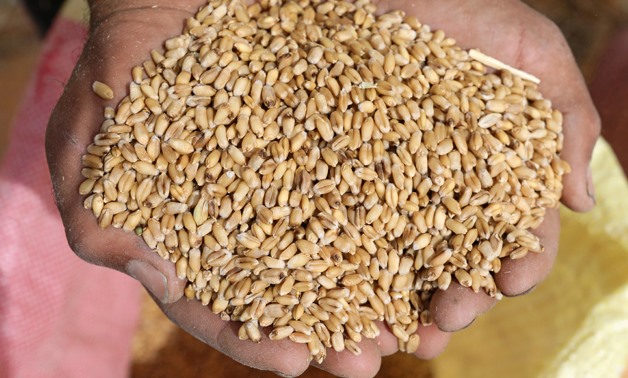
FILE PHOTO: A farmer displays wheat grains at a field in the Beheira Governorate, Egypt May 3, 2018. REUTERS/Mohamed Abd El Ghany/File Photo
CAIRO – 11 November 2021: The Egyptian cabinet approved a procurement price of LE 820 per ardeb (150 kilograms) of wheat at 23.5% purity just as the planting of the local crop was set to begin.
This came according to a press release issued by the Cabinet on Wednesday, after the weekly meeting.
The rate of rise in wheat prices globally will continue, and this is expected to negatively affect Egypt's general budget, which leads to an increase in the value of subsidies, Finance Minister Mohamed Maait expected, in a TV statements.
Egypt is the largest importer of wheat in the world, and the rise in its prices prompted the Egyptian government to cancel wheat tenders 4 times this year, in addition to its decision to increase oil prices by LE 4 to LE 25, a few days ago.
The state treasury is also expected to benefit from the rise in commodity prices, by increasing the customs revenue it obtains from imported goods, according to Maait.
“The current situation related to the rise in commodity prices is exceptional, and inflation rates will decline between three and six months,” Maait said.
Wheat export prices in Russia, the world's largest exporter, have been rising for four months on a weekly basis except for one week last October when the increase stopped briefly.
Chicago futures, a global benchmark for this market, are today near their highest levels since 2013 amid supply problems.
Russian wheat loaded from Black Sea ports for supply in the first half of November amounted to $317 per tonne at the end of last week, up $5 from the previous week, according to consultancy IKAR.
Prices for supplies in the second half of November were $324.
The General Authority for Supply Commodities, the government buyer of wheat in Egypt, bought 360,000 tons in a tender last week between $327 and $328.7 per ton.
The Russian wheat exports have declined 31.5 percent since the start of the 2021-2022 marketing season on July 1, due, among other things, to a tax imposed by Moscow on exports.
Comments
Leave a Comment